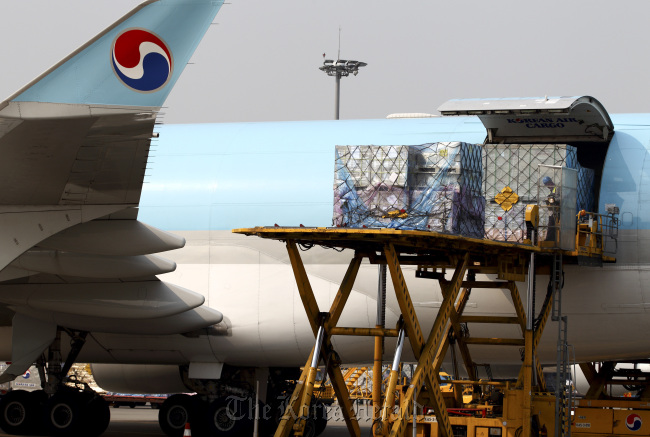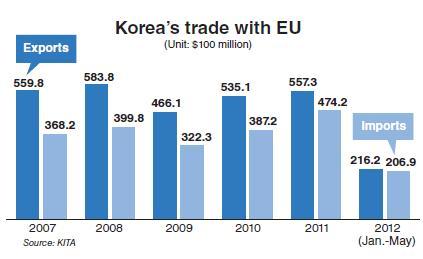
Since it took effect one year ago, FTA helps attract foreign investment, but product price cuts imperceptible
The effect of the free trade agreement between Korea and the European Union has been meager in its first year as the eurozone fiscal crisis dampened the region’s demand for imports.
The FTA, however, appears to have helped attract foreign investment to Korea.
Korea’s exports to the EU since the FTA took effect in July 1 last year through June 15 dropped 12.1 percent from the year before largely due to a sharp decline in shipbuilding orders from the EU amid the fiscal and financial crisis, Seoul’s Finance Ministry said last week. Shipbuilding exports to the EU fell 47.3 percent.

The ministry said, nevertheless, the FTA helped prop up Korea’s economy despite unfavorable external conditions such as the European sovereign debt crisis.
On the positive side, exports of items on which tariffs were cut under the FTA including autos, auto parts and petroleum products, surged 20.2 percent.
Korea became the largest exporter of polyester, which has a high price elasticity of demand, to Italy after the FTA halved the tariff rate on polyester to four percent. It was previously the third largest. In Belgium, Korean products accounted for 80 percent of the imported polyester.
Korea’s imports from the EU over the past year gained 13.5 percent on year. The gap between items that benefited from the FTA and items that didn’t was smaller compared to imports from the U.S.
Imports of items that benefited from the Korea-EU FTA climbed 12.9 percent as Korea began to import European crude oil ($1.58 billion won). Imports of petroleum products more than doubled.
Imports of bags, footwear, watches and cosmetics jumped 35 percent, 31 percent, 51.1 percent and 10.2 percent, respectively.
Imports of items that were unaffected by the FTA also rose 14.9 percent. Imports of computers and wireless telecommunication devices from the EU, which were customs-free already, increased 27.8 percent and 14.6 percent, respectively.
The local unit of a Danish shipping company said it has seen growth in trade between Korea and the EU, but it has not been significant so far.
“There are commodities on which the tax breaks only take place in three years, and we do expect to see growth when tariff reductions are fully put in place,” said Thomas Sorensen, chief of Maersk Korea.
“At this stage, however, due to the ongoing Euro crisis, it is very uncertain how large that growth will be.”
The FTA, nevertheless, appears to have made Korea a more attractive place for foreigners to invest in.
The EU’s Greenfield Investment, or investment in manufacturing or office structures in an area where no previous facilities existed, in Korea increased after the FTA took effect.
Foreign investment in Korea between July 1 last year and May 31 jumped 35 percent from a year ago. Investment in new projects increased 225 percent and Greenfield investment 42 percent in the same period.
According to a think tank under the Korea International Trade Association, the EU’s investment in Korea between July 1 last year and March this year jumped 60.5 percent from a year ago to $3.57 billion.
“Considering that the EU’s investment in Korea from July 2010 to March 2011 dropped 48.8 percent year-on-year, the FTA played a major role in boosting investment,” the KITA’s Institute for International Trade said in a report released Wednesday.
KITA analyst Myung Jin-ho advised that the government should focus on policies to support small and medium-sized companies to make better use of the FTA and attract foreign investment to maximize the effect of the free trade deal.
The general perception among consumers is that the FTA will benefit them and the Korean economy in the long term.
Seven out of 10 Korean consumers believe the FTA would help widen their choices, according to a survey of 500 people by the Korean Chamber of Commerce and Industry. Six out of 10 said it would help raise the competitiveness of Korean companies.
Fifty-three percent said they have purchased EU-made products after the FTA with the world’s largest economic bloc took effect.
Four out of five said they plan to buy EU-made goods in the future, mostly agricultural produce and alcoholic beverage, followed by processed foods, livestock products, designer goods and accessories.
But a majority of the respondents said they had yet to sense price reductions due to the FTA.
Fifty-five percent said it would take two to five years to feel that the FTA has lowered prices of European-made products.
Some local consumer groups said early this month that the price reductions of European goods such as aluminum frying pans and electric irons did not match the tariff cuts. They also said the importers were taking excessive margins, making the local prices up to triple the import prices.
The Fair Trade Commission on Sunday slapped fines of 1.5 billion won on Philips Electronics for not reflecting the reduced tariff on its product prices. The FTC is also monitoring and announcing the prices of EU-made goods on a regular basis, hoping to induce price cuts.
Of the nine EU-made items the FTC recently monitored ― electric irons, electric razors, electric toothbrushes, wine, whiskey, strollers, shampoo, frying pans and cars ― six were priced lower on June 14 compared to before the FTA took effect.
By Kim So-hyun (sophie@heraldcorp.com)
The effect of the free trade agreement between Korea and the European Union has been meager in its first year as the eurozone fiscal crisis dampened the region’s demand for imports.
The FTA, however, appears to have helped attract foreign investment to Korea.
Korea’s exports to the EU since the FTA took effect in July 1 last year through June 15 dropped 12.1 percent from the year before largely due to a sharp decline in shipbuilding orders from the EU amid the fiscal and financial crisis, Seoul’s Finance Ministry said last week. Shipbuilding exports to the EU fell 47.3 percent.

The ministry said, nevertheless, the FTA helped prop up Korea’s economy despite unfavorable external conditions such as the European sovereign debt crisis.
On the positive side, exports of items on which tariffs were cut under the FTA including autos, auto parts and petroleum products, surged 20.2 percent.
Korea became the largest exporter of polyester, which has a high price elasticity of demand, to Italy after the FTA halved the tariff rate on polyester to four percent. It was previously the third largest. In Belgium, Korean products accounted for 80 percent of the imported polyester.
Korea’s imports from the EU over the past year gained 13.5 percent on year. The gap between items that benefited from the FTA and items that didn’t was smaller compared to imports from the U.S.
Imports of items that benefited from the Korea-EU FTA climbed 12.9 percent as Korea began to import European crude oil ($1.58 billion won). Imports of petroleum products more than doubled.
Imports of bags, footwear, watches and cosmetics jumped 35 percent, 31 percent, 51.1 percent and 10.2 percent, respectively.
Imports of items that were unaffected by the FTA also rose 14.9 percent. Imports of computers and wireless telecommunication devices from the EU, which were customs-free already, increased 27.8 percent and 14.6 percent, respectively.
The local unit of a Danish shipping company said it has seen growth in trade between Korea and the EU, but it has not been significant so far.
“There are commodities on which the tax breaks only take place in three years, and we do expect to see growth when tariff reductions are fully put in place,” said Thomas Sorensen, chief of Maersk Korea.
“At this stage, however, due to the ongoing Euro crisis, it is very uncertain how large that growth will be.”
The FTA, nevertheless, appears to have made Korea a more attractive place for foreigners to invest in.
The EU’s Greenfield Investment, or investment in manufacturing or office structures in an area where no previous facilities existed, in Korea increased after the FTA took effect.
Foreign investment in Korea between July 1 last year and May 31 jumped 35 percent from a year ago. Investment in new projects increased 225 percent and Greenfield investment 42 percent in the same period.
According to a think tank under the Korea International Trade Association, the EU’s investment in Korea between July 1 last year and March this year jumped 60.5 percent from a year ago to $3.57 billion.
“Considering that the EU’s investment in Korea from July 2010 to March 2011 dropped 48.8 percent year-on-year, the FTA played a major role in boosting investment,” the KITA’s Institute for International Trade said in a report released Wednesday.
KITA analyst Myung Jin-ho advised that the government should focus on policies to support small and medium-sized companies to make better use of the FTA and attract foreign investment to maximize the effect of the free trade deal.
The general perception among consumers is that the FTA will benefit them and the Korean economy in the long term.
Seven out of 10 Korean consumers believe the FTA would help widen their choices, according to a survey of 500 people by the Korean Chamber of Commerce and Industry. Six out of 10 said it would help raise the competitiveness of Korean companies.
Fifty-three percent said they have purchased EU-made products after the FTA with the world’s largest economic bloc took effect.
Four out of five said they plan to buy EU-made goods in the future, mostly agricultural produce and alcoholic beverage, followed by processed foods, livestock products, designer goods and accessories.
But a majority of the respondents said they had yet to sense price reductions due to the FTA.
Fifty-five percent said it would take two to five years to feel that the FTA has lowered prices of European-made products.
Some local consumer groups said early this month that the price reductions of European goods such as aluminum frying pans and electric irons did not match the tariff cuts. They also said the importers were taking excessive margins, making the local prices up to triple the import prices.
The Fair Trade Commission on Sunday slapped fines of 1.5 billion won on Philips Electronics for not reflecting the reduced tariff on its product prices. The FTC is also monitoring and announcing the prices of EU-made goods on a regular basis, hoping to induce price cuts.
Of the nine EU-made items the FTC recently monitored ― electric irons, electric razors, electric toothbrushes, wine, whiskey, strollers, shampoo, frying pans and cars ― six were priced lower on June 14 compared to before the FTA took effect.
By Kim So-hyun (sophie@heraldcorp.com)
-
Articles by Korea Herald



![[K-pop’s dilemma] Can K-pop break free from ‘fandom’ model?](http://res.heraldm.com/phpwas/restmb_idxmake.php?idx=644&simg=/content/image/2024/05/09/20240509050541_0.jpg&u=20240509173751)




![[News Analysis] Yoon's first 2 years marked by intense confrontations, lack of leadership](http://res.heraldm.com/phpwas/restmb_idxmake.php?idx=644&simg=/content/image/2024/05/09/20240509050612_0.jpg&u=20240509233252)

![[Graphic News] Beer the most favored alcoholic drink by Koreans](http://res.heraldm.com/phpwas/restmb_idxmake.php?idx=644&simg=/content/image/2024/05/09/20240509050765_0.gif&u=)








